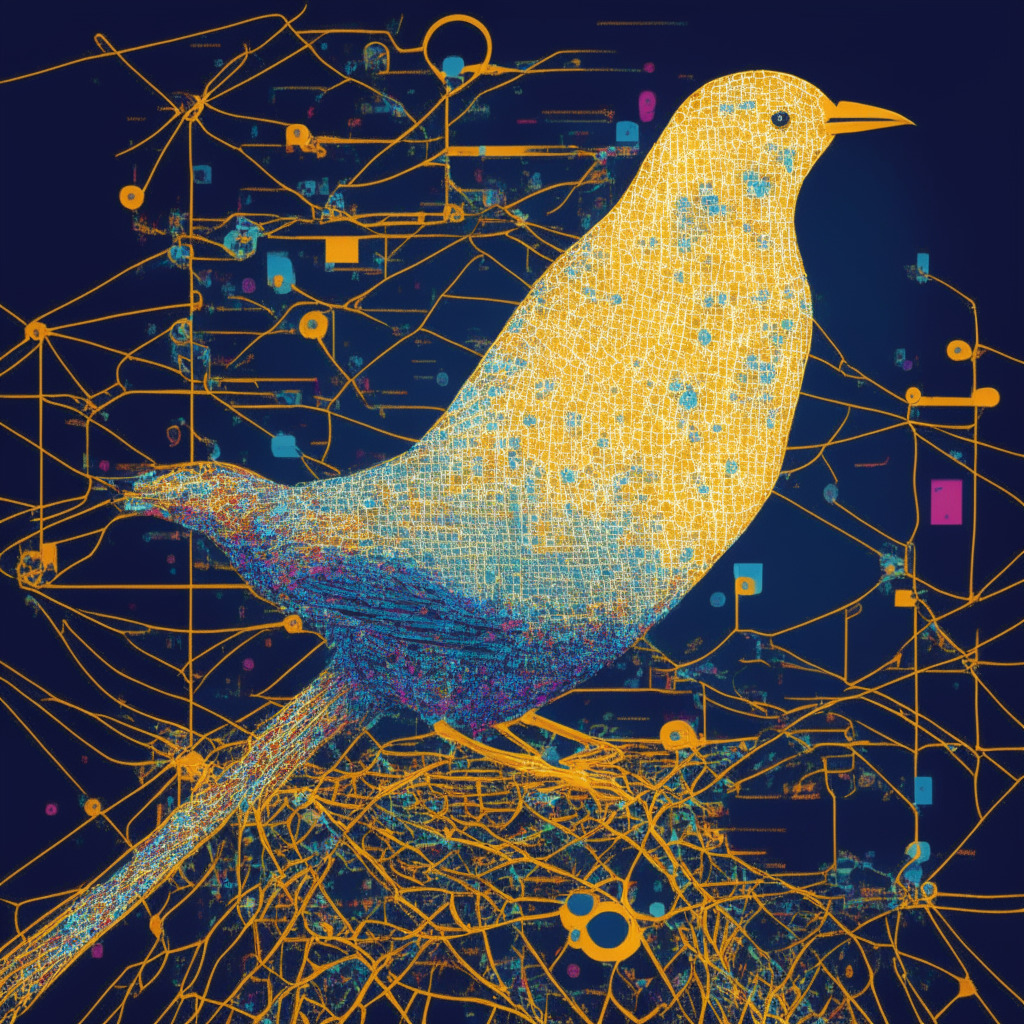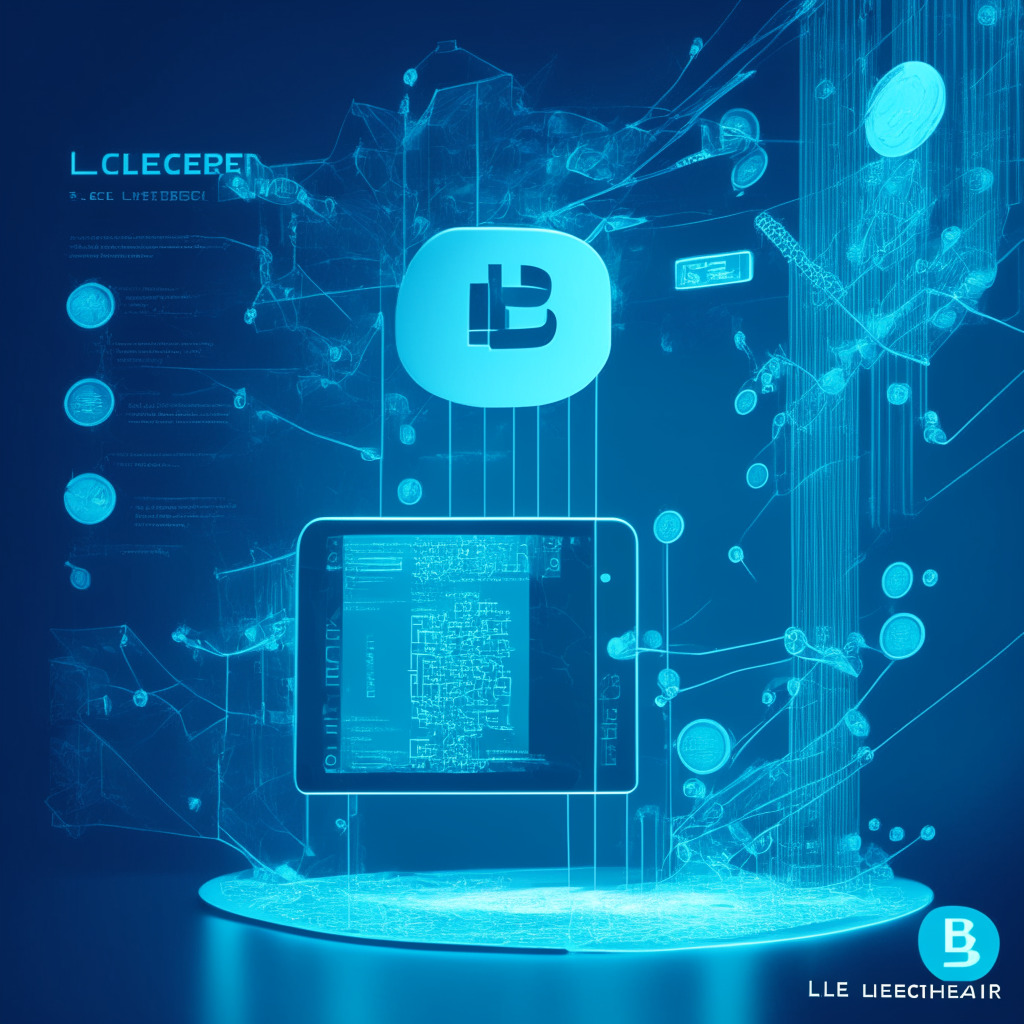“As exciting as the blockchain future is, potential hitches and bumps exist. To thrive, one needs to adapt continuously and reassess strategies, while remaining open to shifts and turns. Investing in these technologies requires a pragmatic yet resilient approach, particularly in the early and volatile days.”
Category: Technology
Crypto Values in Mainstream Platforms: A Closer Look at Twitter’s Community Notes
“Community Notes, initially known as Birdwatch, offers users opportunities to appraise posts’ accuracy, emulating a digital governance form, reminiscent of Wikipedia but directed by an open-source algorithm. While this system aligns with ‘credible neutrality’ concepts from blockchain, its ability to provide an effective, unbiased truth filter remains uncertain.”
Morpheus: Microsoft and LeverFi’s AI Game-changer in Decentralized Finance World
“Microsoft and LeverFi are developing ‘Morpheus’, an AI assistant for portfolio management in the DeFi space. The tech incorporates two AI engines addressing protocol security and market failure, aiming to minimize portfolio losses while enhancing user confidence and control.”
Mastercard’s Venture into Central Bank Digital Currencies: Paradigm Shift or Adventurous Detour?
“Mastercard has initiated a unique forum for stakeholders in the crypto domain to deliberate on the issue of central bank digital currencies (CBDCs). CBDCs are not the same as cryptocurrencies as they are digitized versions of existing fiat currencies backed by issuing governments. Mastercard’s CBDC alliance aims to foster groundbreaking innovations and efficiencies in the digital asset space.”
Clashing Giants: Gitcoin and Shell’s Controversial Partnership for Blockchain Climate Solutions
The blockchain platform Gitcoin and oil-rich Shell have formed a controversial partnership aimed at developing “open-source climate solutions.” Many critics within the crypto community view this alliance as questionable, indicating that the intersection between advanced blockchain technology and ethical responsibility remains a significant challenge.
Democratizing Finance: The Potential Role of Blockchain and Tokenization
“Blockchain technology’s potential lies in tokenization’s ability to democratize finance by offering broader investment options via fractionalized investments. By applying an ETF-like structure to alternative investments such as real estate and private equity, blockchain can offer liquidity, transparency, and efficiency, enhancing investor portfolios. Major institutions are already exploring tokenization, potentially creating a trillion-dollar digital securities market.”
Blockchain Payment Apps: The Real Frontrunners in Payment System Revolution?
Mark Smargon, CEO of Fuse, suggests the future revolution in payment systems could stem from blockchain payments apps, not giants like Ethereum. Despite challenges, such as global regulations, Smargon believes in the potential of Web3 payments, insisting diverse blockchain networks could rival traditional payment systems, such as Visa.
Exploring Restaking: Boosting Innovation or Threatening Ethereum’s Security and Consensus?
‘Restaking’ is an emerging concept that is transforming the cryptographic landscape, paving the way for Etherum stakers to earn additional income. However, while it presents an opportunity to extend Ethereum’s decentralized trust to various systems, it also poses potential systemic risks to the ecosystem, highlighted by Ethereum co-founder, Vitalik Buterin.
Balancing Act: Blockchain Prospects, Challenges, and the Road to Mainstream Adoption
“The partnership between blockchain company Polygon Labs and SK Telecom aims to enhance SKT’s Web3 ecosystem. However, the practical use of incubated Web3 startups and efficient use of Polygon network is in question. Cybercrimes in the crypto industry and the legal controversies surrounding NFTs highlight the urgency for regulatory guidelines and improved security measures. The growth of blockchain technology and AI is promising but challenged by legal and user safety issues.”
Unveiling Moria: The Stakes of Analytical Tools in Bitcoin Mining’s Future
Tether’s CTO, Paolo Ardoino, highlights the need for improved analytical tools in Bitcoin mining. The potential software, named “Moria” aims to use data analytics to enhance mining operations, with a particular focus on harnessing renewable energy. However, the role of such advanced analytics could lead to complex challenges, balancing superior efficiency and increased complexity in Bitcoin mining.
Exploring the Intersection of Gaming and Blockchain: Potentials, Challenges, and the Quest for a ‘Wow’ Moment
“In the convergence of blockchain and gaming, creating a ‘wow’ moment like ‘EVO Moment 37’ could trigger widespread interest and help crypto games gain a broader audience. Meanwhile, Layer-1 network Aelf is offering grants to studios to create blockchain games on their platform, predicting a substantial growth of the blockchain gaming market. Also driving change are games like Nitro Nation, which cleverly integrate NFTs in gameplay.”
PayPal Enters Stablecoin Market: Catalyst for Regulatory Clarity or a Step Away from Decentralization?
“PayPal’s stablecoin, PYUSD, built on the Ethereum network, signals a major step towards crypto adoption in traditional finance. Despite concerns about its centralized structure, PYUSD could clarify crypto regulations, accelerate token usage, consolidate crypto payment with traditional finance, and encourage wider adoption of blockchain technology.”
Tether’s Discontinuation of Omni and Other Platforms: A Bold Move or High Risk?
Tether, the largest stablecoin issuer, announced to discontinue support for Omni, Kusama, and Bitcoin Cash SLP implementations, causing ripples in crypto community. Despite the change, Tether’s price remained fairly stable, raising questions about subsequent implications for user strategy in the volatile crypto-market.
Securitize’s Acquisition of Onramp Invest: Mark of Progress or Potential Pitfall in Digitized Finance
Securitize, a firm specializing in tokenizing assets, has acquired digital asset wealth platform, Onramp Invest. This move aligns with Securitize’s objective to let registered investment advisors offer digitized asset classes. The acquisition can signal market consolidation in digital assets sector amid shrinking technology valuations and limited venture capital investments.
Navigating AI in Online Search Engines and Cryptocurrency Mining: Potential & Peril
“Google’s recent upgrade to its search engine involves advanced generative AI features designed to enrich search results and quicken navigation in complex articles. In response, Quantum Blockchain Technologies is developing AI-powered algorithms to enhance Bitcoin mining efficiency. However, potential concerns include further consolidation of mining power, posing a risk to blockchain’s decentralization principle.”
Jada AI: A Game Changer in Blockchain & AI or a Technical Hurdle too High?
Jada AI, a revolutionary project using AI in a blockchain-based environment, aims to change decision-making and scale operations, allowing AI computations to be executed within the network. With investors onboard, it’s reinforcing trust in blockchain through transparency, while navigating data privacy and cybersecurity challenges.
CBDCs: Kazakhstan’s Digital Currency Ambitions and the Power Shortages Plaguing Crypto Miners
Former Soviet nations like Kazakhstan are making strides towards embracing Central Bank Digital Currency (CBDC). Echoing Russia and Belarus’ approach, Kazakhstan proposes its CBDC as an ‘add-on’ to existing cash and non-cash payment forms. Despite certain challenges with digital currencies, the nation anticipates full implementation of its CBDC by 2025.
Crypto Education in El Salvador: Gateway to Financial Access or Exposure to Instability?
In El Salvador, an initiative has begun to educate children on Bitcoin and cryptocurrencies. The Bitcoin Beach program educates on money and digital economies, providing advantages for potential employment opportunities in the growing digital currency world. However, concerns over the volatility and security risks of cryptocurrencies remain.
Shibarium Unveiling: A Decentralized Leap Beyond Ethereum’s Shortcomings
The Shiba Inu developers recently launched Shibarium, an Ethereum layer-2 scaling solution. This significant development, capable of enhancing transaction speed and reducing associated ‘gas’ fees, marks an exciting expansion phase for the decentralized crypto community. This technology prioritizes decentralization and user experience, aiming to revolutionize the future of blockchain and data privacy.
Unleashing Shibarium: Shiba Inu’s L2 Ethereum Blockchain Revolution and Its Prospects
Shibarium, the Ethereum L2 blockchain of Shiba Inu, has launched on the mainnet promising a scalable transaction platform built on proof-of-participation mechanism. With over 21 million wallets created pre-launch, Shibarium has attracted various new projects and it’s expected to significantly impact the crypto ecosystem.
Sei: New Trading-Focused Blockchain Star Amid Controversies and Growing Expectations
“Sei, a trading-focused blockchain network created by Jump Crypto and Multicoin Capital, debuted a market cap of over $400 million. Despite a successful launch, controversy over a delayed airdrop and eligibility issues, coupled with a lack of transparency, have raised concerns. 40% of SEI’s circulating supply is for the team and private investors, 48% for airdrops and ecosystem reserves, with the rest for the SEI Foundation and Binance launchpool incentives.”
Ethereum’s Buterin Highlights Crypto Values in Mainstream Social Media: A Boon or a Bane?
Co-founder of Ethereum, Vitalik Buterin, discusses how the Community Notes tool used by a platform ‘X’, embodies ‘crypto values’. This tool has been successful in countering misinformation. The merge of social media and the blockchain could potentially create a transparent, decentralized control system, or allow powerful individuals to manipulate the system.
Redefining Use Cases: The Journey from Crypto Assets to Digital Renaissance
“Crypto progression mirrors how Web2 revolutionized informational accessibility. Decentralized finance (DeFi) pioneers a banking industry catered towards Web3, poised for a crucial paradigm shift. DAOs echo small businesses fostering economic activity, with Humans and AI unified through fintech networks, hinting a digital renaissance. However, challenges persist and must be addressed.”
Unleashing the Microchain Strategy – Linera’s Innovative Solution to Blockchain Scalability Issues
Emerging blockchain project, Linera, has secured $6 million in funding for team expansion and protocol development. The protocol, introduced by ex-Meta Novi engineer Mathieu Baudet, innovatively addresses scalability issues by utilizing “microchains” within the main blockchain, potentially improving Web3 app interactions and reducing infrastructure unavailability during traffic peak times. However, the extensive interconnectivity this model introduces could create potential vulnerabilities.
Nova Labs’ Disruptive $5 Month Phone Plan: A Revolutionary Bet on Blockchain and 5G Technology
Nova Labs, a blockchain startup, revealed plans for a $5 monthly phone plan using 5G hotspots owned by individuals and businesses. This service aims to disrupt the telecom industry, supported by the startup’s Helium Network which rewards hotspot owners with crypto tokens for data provided to customers.
Scaling Ethereum: The Pros and Cons of zkEVM Linea Rollup Solution
“The successful launch of zkEVM Linea, a scaling solution for the Ethereum ecosystem, has securely bridged $26 million in ETH. This rollup offers lower transaction costs and higher throughput for decentralized applications (DApps), presenting an immense potential within the Ethereum ecosystem.”
Seamless Crypto Transactions: Ledger Live Integrates PayPal to its Platform
Hardware wallet producer Ledger has integrated its Ledger Live software with PayPal to allow US-based PayPal account holders to acquire digital assets directly. This new feature enables immediate transfer of cryptocurrencies such as Bitcoin, Ether, Bitcoin Cash, and Litecoin to the user’s wallet, eliminating the need for a separate withdrawal process. This integration aims to simplify crypto transactions while ensuring high security.
Bitcoin’s Fee-to-Reward Ratio: Balancing User Experience, Security and Sustainability
Bitcoin’s fee-to-reward ratio critically impacts transaction speed, network security, and overall stability of the blockchain. In times of heavy traffic, users potentially pay more for quick verification, fostering network efficiency and aiding miners’ profitability. Ultimately, this ratio could dictate Bitcoin’s future economic sustainability.
Unveiling AI’s Role in the Future of Content Moderation: An Examination of Potential and Pitfalls
“Artificial Intelligence, like OpenAI’s GPT-4, presents potential for streamlined content moderation, offering faster turnover times and improved consistency. However, challenges like prediction accuracy, understanding complex human dynamics, and privacy considerations need addressing for successful AI integration in our digital society.”
Unleashing the Billion-Dollar Beast: Arbitrum’s Unlocking Future and its Impact on Crypto Markets
“Arbitrum plans to unfreeze more than $1 billion worth of its ARB tokens, marking the beginning of a four-year period of staggered token releases. This ‘cliff unlock’ strategy unfreezes a set percentage of tokens, injecting liquidity into the system. However, the impact on ARB’s future value remains uncertain, underscoring the unpredictability of the crypto realm.”
Blockchain Gaming’s Dilemma: Illuvium’s Fall and the Quest for Quality Experience
The gaming industry’s move towards GameFi highlights concerns such as unfinished games and underperforming titles in the blockchain gaming realm. Although blockchain games like Illuvium generate excitement, there is criticism this is more hype than substance. Prioritizing quality gaming experience alongside market appeal and consumer trust could determine these projects’ success.
Unraveling the Energy Conundrum: Blockchain’s Role in Driving a Sustainable Future
“Binance recently addressed Bitcoin’s high energy consumption concerns, emphasizing the shift in contemporary blockchains towards more energy-efficient mechanisms like proof of stake (PoS). This transition has significantly reduced power consumption and carbon footprint, providing a boost to green energy initiatives and promoting transparency in tracking carbon emissions across supply chains.”































